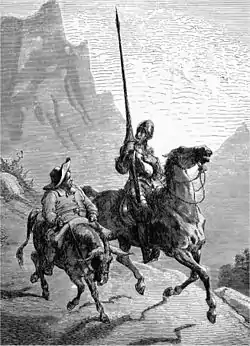Don Quixote
English

Don Quixote of La Mancha and Sancho Panza, by Gustave Doré, 1863
Etymology
Borrowed from Spanish Don Quixote, the older spelling of modern Spanish Don Quijote.
Pronunciation
Proper noun
- A famous 1605–1615 Spanish novel by Miguel de Cervantes (1547–1616), whose full title is El ingenioso hidalgo don Quijote de la Mancha (The Ingenious Gentleman Don Quixote of La Mancha).
- The protagonist of this novel.
Derived terms
Translations
the protagonist of a famous Spanish novel
|
Noun
Don Quixote (plural Don Quixotes)
- (also attributive) Any person or character who displays quixotism.
- 1912, Arthur Conan Doyle, The Lost World […], London, New York, N.Y.: Hodder and Stoughton, →OCLC:
- But he was a born leader. As danger thickened his jaunty manner would increase, his speech become more racy, his cold eyes glitter into ardent life, and his Don Quixote moustache bristle with joyous excitement.
- 2012, Claire B. Gunnels, Susan E. Green, Patricia M. Butler, Joint Libraries: Models That Work, page 161:
- […] while joint libraries are wonderful endeavors, which may or may not be a part of our future, they also represent the best of human cooperation for the greater good. This book is dedicated to these Don Quixotes of the library world.
Asturian
Etymology
Borrowed from Spanish Don Quixote, the older spelling of modern Spanish Don Quijote.
Pronunciation
- IPA(key): /ˌdon kiˈʃote/, [ˌd̪õŋ kiˈɕo.t̪e]
German
Pronunciation
- IPA(key): /ˌdɔn kiˈʃɔt(ə)/
Audio (file)
Proper noun
Don Quixote m (proper noun, strong, genitive Don Quixotes or (with an article) Don Quixote)
- Alternative spelling of Don Quichotte
Spanish
This article is issued from Wiktionary. The text is licensed under Creative Commons - Attribution - Sharealike. Additional terms may apply for the media files.